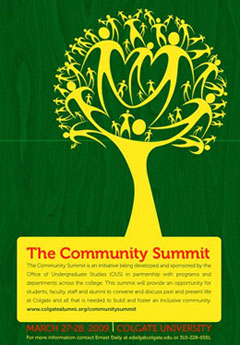More than 35 alumni will visit campus this weekend to discuss ways that Colgate can continue to support diversity and build on its efforts to develop an inclusive community.
Students, faculty, and staff also will take part in the Community Summit, which opens Friday night with remarks by senior administrators, including President Rebecca Chopp and Dean of Diversity Keenan Grenell, and ends on Sunday with a networking session hosted by the Alumni of Color group.
 On Saturday, participants will work in small affinity groups and discuss issues pertaining to members of underrepresented communities on campus.
On Saturday, participants will work in small affinity groups and discuss issues pertaining to members of underrepresented communities on campus.
A larger group session then will address these issues with an eye toward developing steps for continued dialogue and overcoming any obstacles participants identify for creating a robust inclusive community.
“We want to create an action plan – a living document – that will help us create strategies for moving forward,” said Jaime Nolan, director of the Office of Undergraduate Studies.
There also will be sessions about how diversity efforts are integrated in student affairs programming and in classroom experiences. A session will focus on gender and sexuality, and another forum will involve students in the Unity Coalition who crafted a proposal on fostering diversity.
Loncey Mills ’02, communications co-chair for Alumni of Color, will be taking part in the weekend’s sessions.
“The summit is apparently about members of the general Colgate community moving forward, but that’s only from this point in time. I’m positive some alumni and Colgate staff alike will add their extended perspectives, myself included,” said Mills.
Nolan and Ernest Daily, assistant director of OUS, have worked with numerous departments and programs and with the Office of Alumni Affairs in organizing the summit, which also will celebrate the 40th anniversary of OUS.
The summit is a constructive way to keep the conversation about race moving in a positive direction, and reinforcing how important diversity is to the campus community and in particular to students, according to Grenell.
“Our students can become critical thinkers by thriving in a community that values all forms of intellectual rigor and respects the complexity of human understanding,” he said. “It’s imperative that we prepare them to become leaders in the ever more diverse, more global 21st century.”